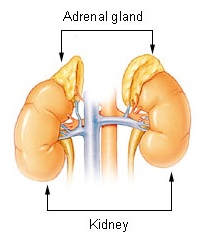Absent adrenal gland
| Absent adrenal gland | |
|---|---|
 | |
| This condition indicates absence of a adrenal gland | |
| Specialty | Medical genetics |
Absent adrenal gland is a rare condition where the adrenal gland is absent at birth.[1] It should not be confused with adrenal insufficiency or congenital adrenal hyperplasia, where the gland is present but may not be functioning adequately.
Due to the absence of adrenal cortex, the condition causes extreme symptoms of adrenal insufficiency at birth due to very low levels of aldosterone and cortisol. The adrenal medulla can be normally present, poorly formed, or absent, however even so the effects of circulatory catecholamine deficiency are generally mild (due to sympathetic nervous system compensation), except in episodes of hypoglycemia.[2]
Genetics[]
SF-1 plays a role in the development of adrenal gland. Single gene polymorphism involving SF-1 gene may have a role in adrenal gland agenesis.[1] Various other factors have also been identified.[3][4][5][6]
Diagnosis[]
This section is empty. You can help by . (November 2017) |
Treatment[]
This section is empty. You can help by . (November 2017) |
References[]
- ^ a b Vachharajani A, Bethin K, Mouillet JF, Sadovsky Y, Saunders S (February 2006). "The rare occurrence of absent adrenals in a term infant: a case report and review of the literature". Am J Perinatol. 23 (2): 111–4. doi:10.1055/s-2006-931911. PMID 16506117.
- ^ Fung, M. M.; Viveros, O. H.; O’Connor, D. T. (16 November 2007). "Diseases of the adrenal medulla". Acta Physiologica. 192 (2): 325–335. doi:10.1111/j.1748-1716.2007.01809.x. PMC 2576282. PMID 18021328.
- ^ Else, T; Hammer, GD (December 2005). "Genetic analysis of adrenal absence: agenesis and aplasia". Trends in Endocrinology and Metabolism. 16 (10): 458–468. doi:10.1016/j.tem.2005.10.004. PMID 16275119. S2CID 32644554.
- ^ Sethuraman, C; Parker, MJ; Quarrel, O; Rutter, S; de Krijger, RR; Drut, R; Cohen, MC (2011). "Bilateral absence of adrenal glands: a case series that expands the spectrum of associations and highlights the difficulties in prenatal diagnosis". Fetal and Pediatric Pathology. 30 (2): 137–43. doi:10.3109/15513815.2010.519573. PMID 21391755. S2CID 19435202.
- ^ Cohen MM, Jr (January 2010). "Hedgehog signaling: endocrine gland development and function". American Journal of Medical Genetics Part A. 152A (1): 238–44. doi:10.1002/ajmg.a.32917. PMID 20013843. S2CID 878642.
- ^ Pakravan, P; Kenny, FM; Depp, R; Allen, AC (January 1974). "Familial congenital absence of adrenal glands; evaluation of glucocorticoid, mineralocorticoid, and estrogen metabolism in the perinatal period". The Journal of Pediatrics. 84 (1): 74–8. doi:10.1016/S0022-3476(74)80556-1. PMID 12119960.
External links[]
| Classification |
|---|
- Congenital disorders of endocrine system
- Adrenal gland disorders
- Rare diseases